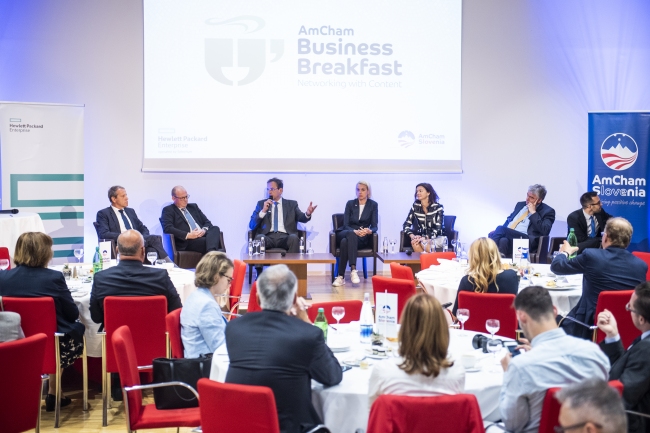Candidates of parliamentary parties running in the EU election exchanged views on the future of the European project at an AmCham Business Breakfast, entitled Quo Vadis, Europe? They called for stability and building of trust. They also raised the issue of unity of Slovenian MEPs.
Klemen Grošelj of the Marjan Šarec List (LMŠ) said that if elected, he would strive for more cohesion in the EU so that the bloc could contribute to security and stability in the world. He believes member states must agree to which strategic areas they want to expand their cooperation. According to him, the difference in development among members states are a long-term threat to the bloc and should be tackled within some kind of a common social framework.
Igor Šoltes of the Pensioners' Party (DeSUS) said that almost 70 years after the Schuman Declaration the very foundations of European integration must be set anew and the development differences addressed. While the relations between member states and the EU should be clearly defined, it would be difficult to transfer additional sovereignty onto the EU level at this point, Šoltes believes. Žiga Turk of New Slovenia (NSi) stressed that the EU should not act as a nanny state but rather assume other important roles. The NSi believes that any protective policies should be restricted to the national, regional and local levels.
Asked what will be crucial for EU youth in the future, Šoltest highlighted intergenerational solidarity, Grošelj listed carbon-free society and digital development, and Turk singled out efforts for making the EU a peaceful, stable and promising area in the world of danger and uncertainty. The SocDem frontrunner, Tanja Fajon, believes optimism will be very important along with the fight against climate change, the lowering of unemployment, fair taxation and social justice, and legalisation of cannabis. Milan Zver, speaking on behalf of the joint list of the Democrats (SDS) and the non-parliamentary People's Party (SLS), stressed the importance of education and employment.
The top candidate of the Modern Centre Party (SMC), Gregor Perič, rejected the assessment that young people today are individualists. In fact, they are communitarian, because they want to be able to do well in this society and make a name for themselves, he said. Angelika Mlinar of the Alenka Bratušek Party (SAB) said that the EU's success depended to some extent on the attitude of top politicians in member states to Brussels. Criticising the EU is still a successful political strategy in many countries, she warned. Turning to the work of Slovenian MEPs, Perič said he would like to see more unity among them, freshness, team spirit and less bias stemming from national divisions. Fajon agreed, noting that the lack of unity often hurt Slovenia. She said this happened after the announcement of the Slovenian-Croatian border arbitration award. But Slovenia's strategic interest should also be more clearly defined, she believes. Zver said that in democracy people have different views, so he sees no point in unity on all matters. But when it comes to national interest, there should be no division, he said.
The debate was not attended by the representatives of the National Party (SNS) and the Left, who excused themselves.
Before the AmCham Business Breakfast we have sent out a questionnaire to all the parties, participating in the debate, about some crucial questions regarding the European Union. You can read the answers HERE (the document is in Slovene language).
You can watch the whole event on our Facebook page.
You can also see the photos from the event on our Facebook page.
Source: STA

